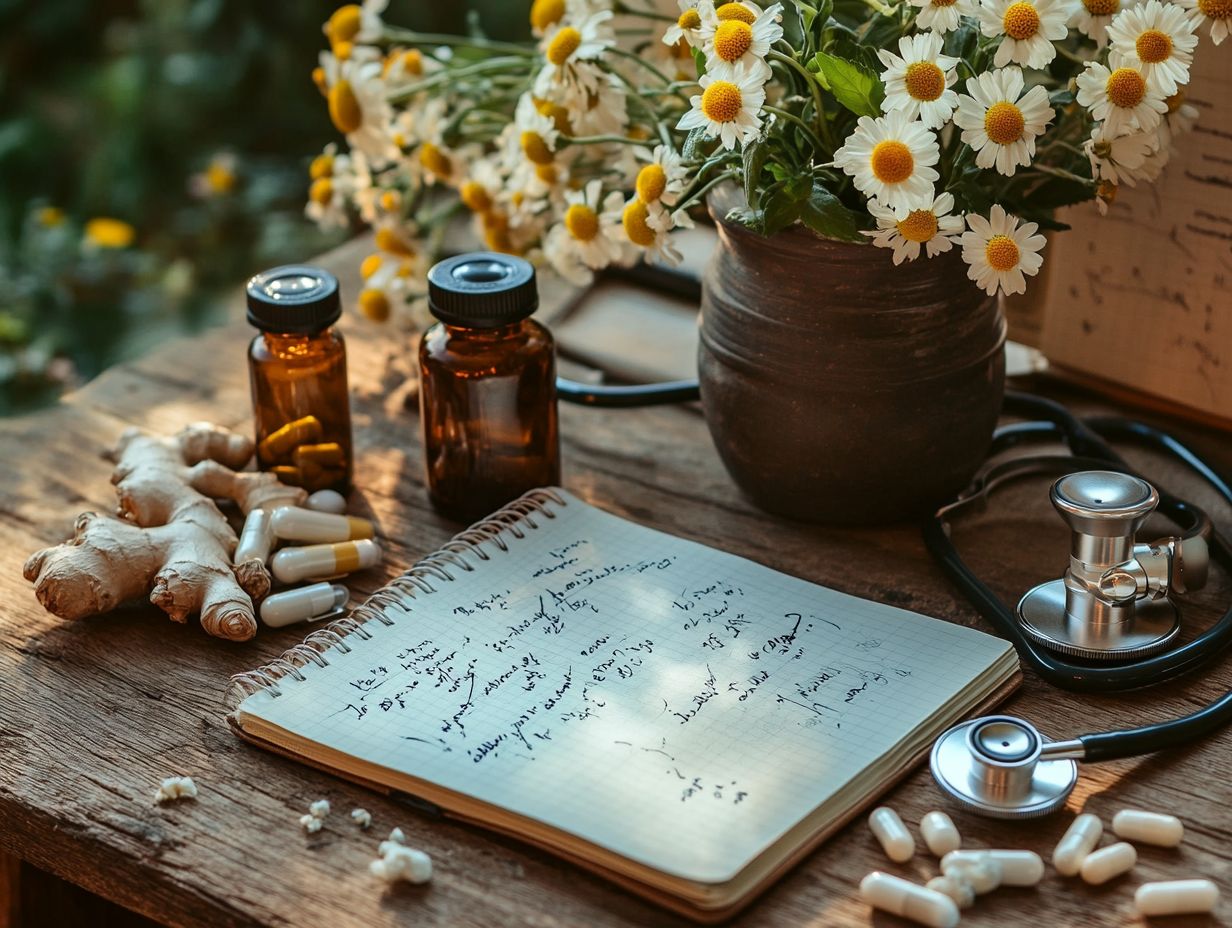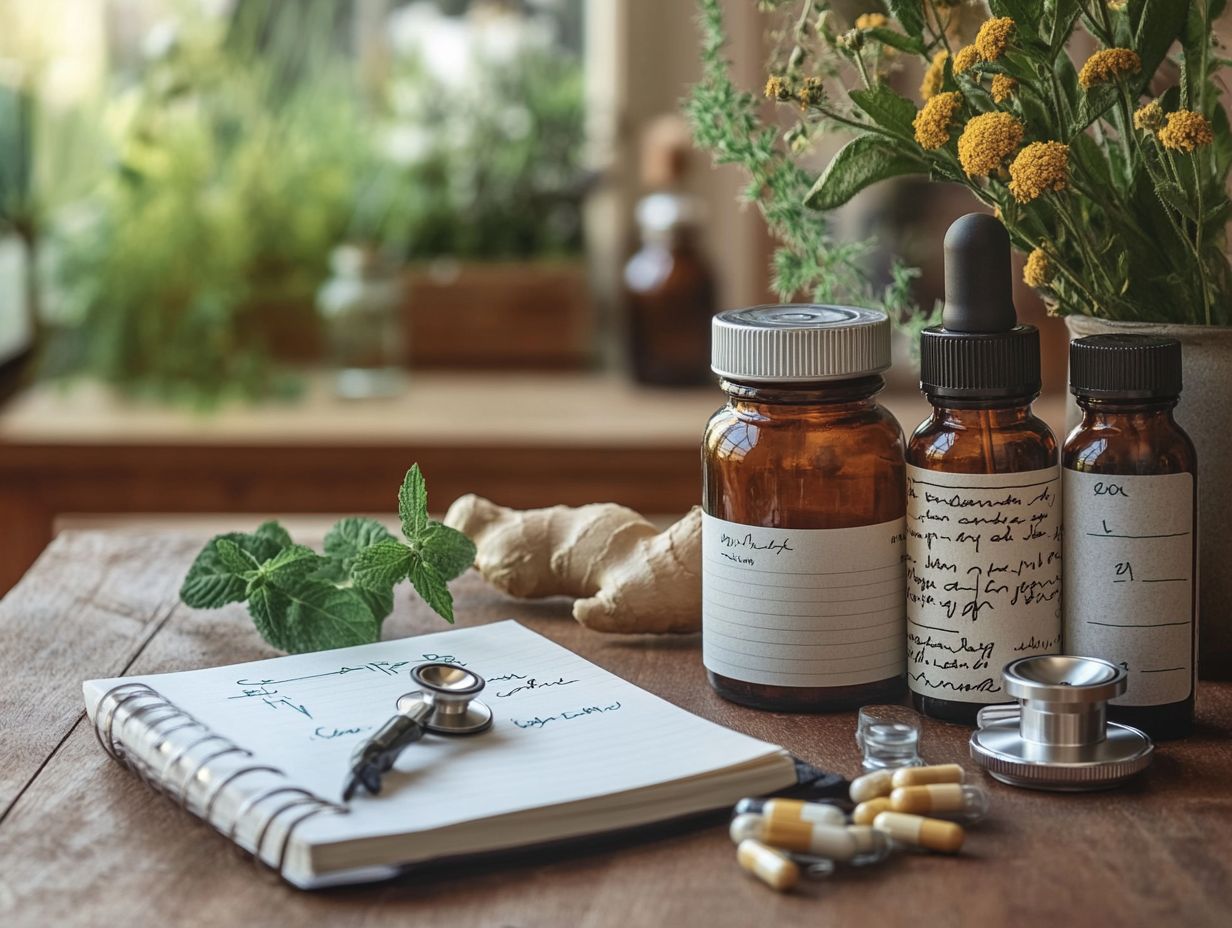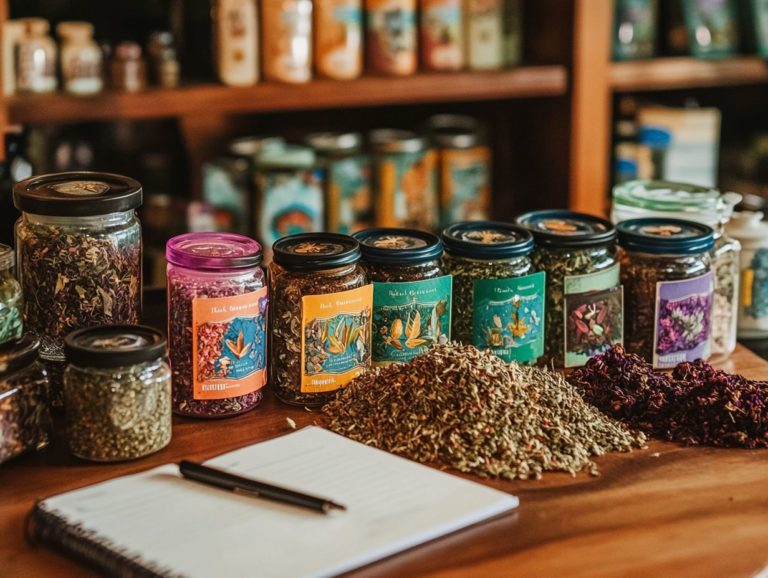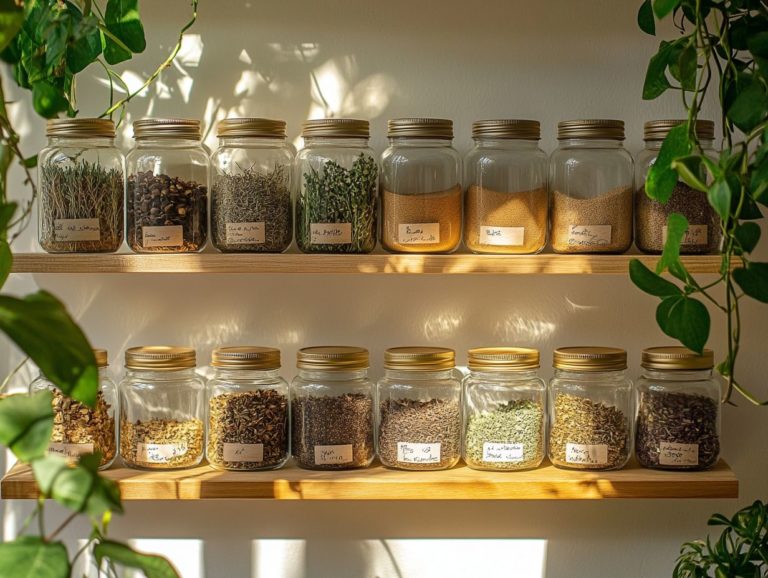Can I Combine Herbal Remedies with Other Treatments?
Herbal remedies and dietary supplements have been cherished for their potential health benefits. They often serve as natural alternatives or complements to traditional treatments.
In this exploration, you’ll uncover the essence of herbal remedies, delve into their mechanisms, and discover how they may enrich your wellness journey through complementary medicine and alternative therapies.
It’s crucial to consult with healthcare professionals, as this article emphasizes safety assessments to ensure effective use of herbal supplements.
Whether you’re a seasoned herbalist or simply curious, this guide offers valuable insights to help you navigate the fascinating world of herbal medicine.
Contents
- Key Takeaways:
- Discover the Power of Herbal Remedies!
- Combining Herbal Remedies with Other Treatments
- Consulting with a Healthcare Provider
- Safety Considerations
- Frequently Asked Questions
- Wondering if you can combine herbal remedies with other treatments? Here’s what you need to know!
- Are there any treatments that should not be combined with herbal remedies?
- How can I determine if it is safe to combine herbal remedies with my current treatments?
- Can combining herbal remedies with other treatments improve their effectiveness?
- What should I do if I experience any negative side effects from combining herbal remedies with other treatments?
- Is there anything I should be aware of when combining herbal remedies with other treatments?
Key Takeaways:

- You can combine herbal remedies with other treatments, but be aware of potential drug interactions.
- Always consult a healthcare provider before beginning any supplements.
- Learn how herbal remedies work to use them safely and effectively.
Discover the Power of Herbal Remedies!
Understanding herbal remedies invites you to explore their historical roots and modern applications. These remedies, derived from medicinal plants, are celebrated for their potential therapeutic benefits across various health conditions. They have gained traction in managing chronic diseases, presenting a complementary option alongside traditional treatments.
Herbal medicine, rich in plant extracts, offers a promising avenue for natural healing. Therefore, it’s essential to seek out reliable resources to ensure safety and efficacy.
What are Herbal Remedies?
Herbal remedies are natural substances sourced from plants, often embraced as dietary supplements to enhance health and wellness.
These remedies carry a rich history that spans centuries, originating from ancient civilizations that celebrated the healing powers of herbs. They encompass a variety of products such as tinctures, capsules, teas, and essential oils.
Take chamomile, known for its calming properties, or turmeric, celebrated for its anti-inflammatory benefits. These common natural remedies can easily integrate into your daily routine. By weaving herbal products into your diet, you can enhance your overall health while reducing reliance on synthetic solutions.
How Do They Work?
Herbal remedies have intricate ways of interacting with your body, potentially helping with health management and enhancing wellness.
These interactions include how your body absorbs and uses the remedies, as well as how they influence cellular responses. For example, turmeric’s active compound, curcumin, exhibits anti-inflammatory properties and interacts with the metabolism of various pharmaceuticals, making safety assessments essential for those managing chronic diseases.
Garlic is another noteworthy example, known for improving heart health by modulating lipid metabolism and reducing platelet aggregation. Understanding these mechanisms enables you to safely incorporate herbal remedies into your chronic disease management strategies, ensuring a harmonious approach to wellness.
Combining Herbal Remedies with Other Treatments

Combining herbal remedies with other treatments can provide a sophisticated approach to enhancing health. However, it’s essential to exercise caution, as there may be potential drug interactions with prescription medications and inherent risks associated with herbal supplements.
Careful consideration is crucial to ensure a harmonious balance in your health regimen.
In conclusion, exploring herbal remedies can lead to exciting discoveries about your health. Start by consulting with healthcare professionals and incorporating trusted herbal supplements into your routine. Your wellness journey awaits!
Potential Benefits
Herbal supplements can enhance your management of chronic diseases. They also support your overall well-being with natural remedies.
These natural options provide a multifaceted approach to health, tackling both symptoms and the underlying causes of various health conditions.
For example, turmeric is celebrated for its anti-inflammatory properties. It may be particularly helpful for those dealing with arthritis, as it can reduce pain and improve joint function.
Garlic supports cardiovascular health by lowering cholesterol and blood pressure. Ashwagandha is known for helping the body cope with stress and is often embraced for its adaptogenic qualities. It assists in managing stress and anxiety levels, which is especially valuable for those facing chronic stress-related health issues.
By integrating these herbal supplements into your wellness routine, you might find relief from symptoms and enjoy improved health outcomes over time.
Possible Interactions and Risks
While herbal remedies may offer various benefits, they also come with potential interactions and risks, particularly regarding drug interactions that can lead to adverse reactions.
These interactions can differ significantly, ranging from mild effects that reduce a medication s effectiveness to severe complications that could jeopardize your health.
If you use herbal supplements, talk openly with your healthcare provider to ensure all substances being taken are disclosed.
Clinical trials have indicated that certain herbs, such as St. John s Wort, can notably diminish the efficacy of medications prescribed for depression and anxiety. Likewise, garlic and ginseng have been associated with changes in blood-thinning medications, potentially heightening the risk of bleeding.
Such findings highlight the critical need for clinician oversight in managing both herbal and pharmaceutical treatments.
Consulting with a Healthcare Provider
Consulting with a healthcare provider is essential when contemplating the use of herbal remedies. This professional guidance helps you safely use these supplements in your health management practices. It also ensures that you re making informed decisions tailored to your individual needs.
When to Seek Professional Advice

Don’t hesitate to seek professional advice when considering herbal remedies, especially if you’re managing chronic diseases or currently taking prescription medications.
Navigating the complexities of health can feel daunting, particularly for those dealing with chronic conditions like diabetes or hypertension. In these situations, engaging with healthcare providers is essential; they can offer guidance tailored to your unique needs.
These professionals are not just a source of information they re key players in your education about health, especially regarding herbal product evaluations. Consulting with a healthcare professional ensures your safety is prioritized, minimizing risks associated with combining various therapies and optimizing your health outcomes.
How to Discuss Herbal Remedies with Your Healthcare Provider
When discussing herbal remedies with your healthcare provider, be completely open about all the supplements you re taking. This transparency helps healthcare professionals consider any potential interactions with prescribed medications and your existing health conditions.
To make the most of your appointment, prepare a comprehensive list of all herbal supplements, including green tea extract, beforehand. Don t forget to mention any changes in usage or dosage.
Engaging actively with your healthcare professionals creates a collaborative environment, ultimately leading to better health outcomes and personalized treatment plans tailored just for you.
Safety Considerations
Safety considerations take center stage when using herbal remedies and dietary supplements. It’s essential to conduct careful safety checks, engage in quality testing, and evaluate potential risks associated with herbal supplements.
Being diligent helps you avoid adverse drug reactions and ensures a secure experience with your chosen remedies.
Ensuring Safe and Effective Use of Herbal Remedies
To ensure the safe and effective use of herbal remedies, adhere to established safety assessments and rely on trustworthy resources for herbal medicine information.
Start by thoroughly researching products, focusing on those that have passed rigorous quality testing by third-party laboratories. Understanding the origin of the herbs is crucial; sourcing from reputable suppliers who prioritize transparency in their cultivation practices can minimize the risk of contamination and adulteration.
Read user reviews and consult healthcare professionals for additional peace of mind. This approach allows you to make informed decisions about which products meet high safety standards and efficacy requirements.
By being diligent about these factors, you contribute to a safer experience when integrating herbal remedies into your wellness regimen.
Frequently Asked Questions

Wondering if you can combine herbal remedies with other treatments? Here’s what you need to know!
Yes, in most cases, herbal remedies can be safely combined with other treatments. However, always consult your healthcare professional before doing so to ensure there are no potential interactions or contraindications.
Are there any treatments that should not be combined with herbal remedies?
Yes, certain treatments should not be combined with herbal remedies, including:
- Prescription medications
- Chemotherapy drugs
- Immunosuppressants
It’s important to disclose all treatments you are currently undergoing to your healthcare provider before incorporating herbal remedies.
How can I determine if it is safe to combine herbal remedies with my current treatments?
Always consult your healthcare professional to assess your individual situation and receive personalized recommendations based on your medical history and current treatments.
Can combining herbal remedies with other treatments improve their effectiveness?
Combining herbal remedies with other treatments may enhance their efficacy, but this can vary depending on the specific remedies and treatments. Always consult your healthcare professional for personalized advice.
What should I do if I experience any negative side effects from combining herbal remedies with other treatments?
If you experience any negative side effects, stop using the remedies right away and consult with a healthcare professional. They can assess the situation and provide guidance on how to proceed.
Is there anything I should be aware of when combining herbal remedies with other treatments?
Yes, keep in mind the following:
- Disclose all treatments you are currently undergoing to your healthcare provider.
- Start with low doses of herbal remedies.
- Monitor for any potential interactions or side effects.
Ready to explore herbal remedies? Start your journey with these tips, and prioritize your health!






